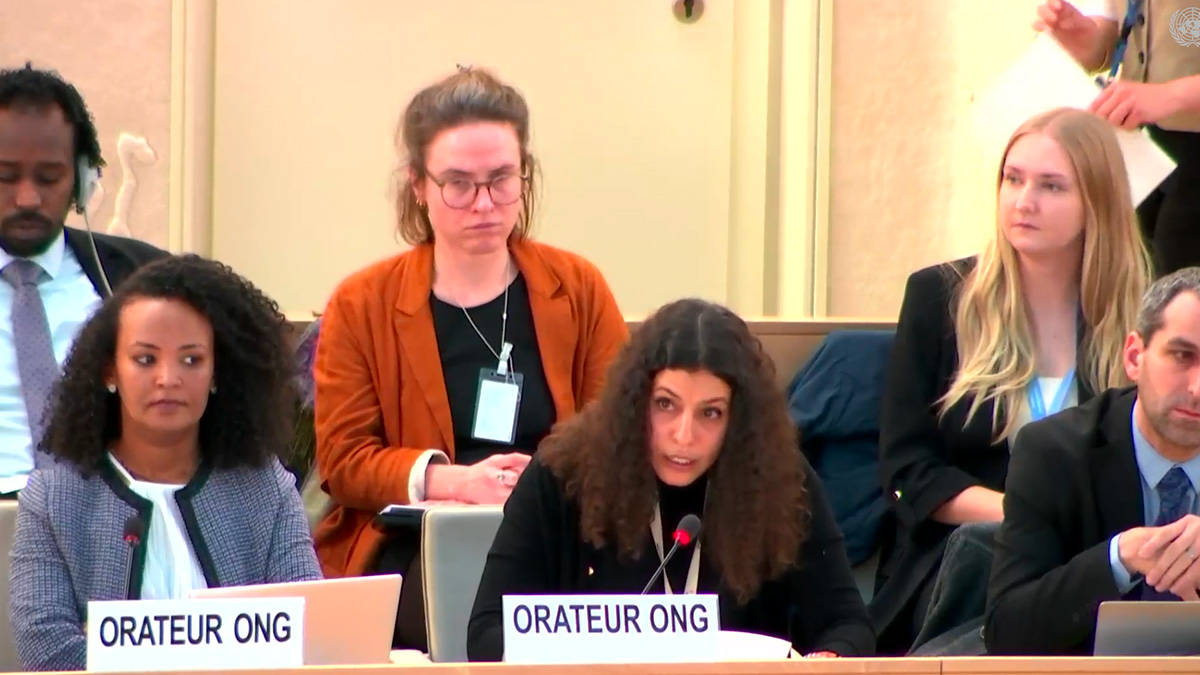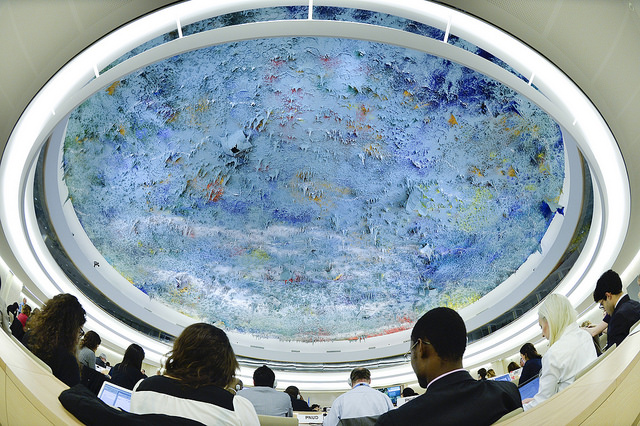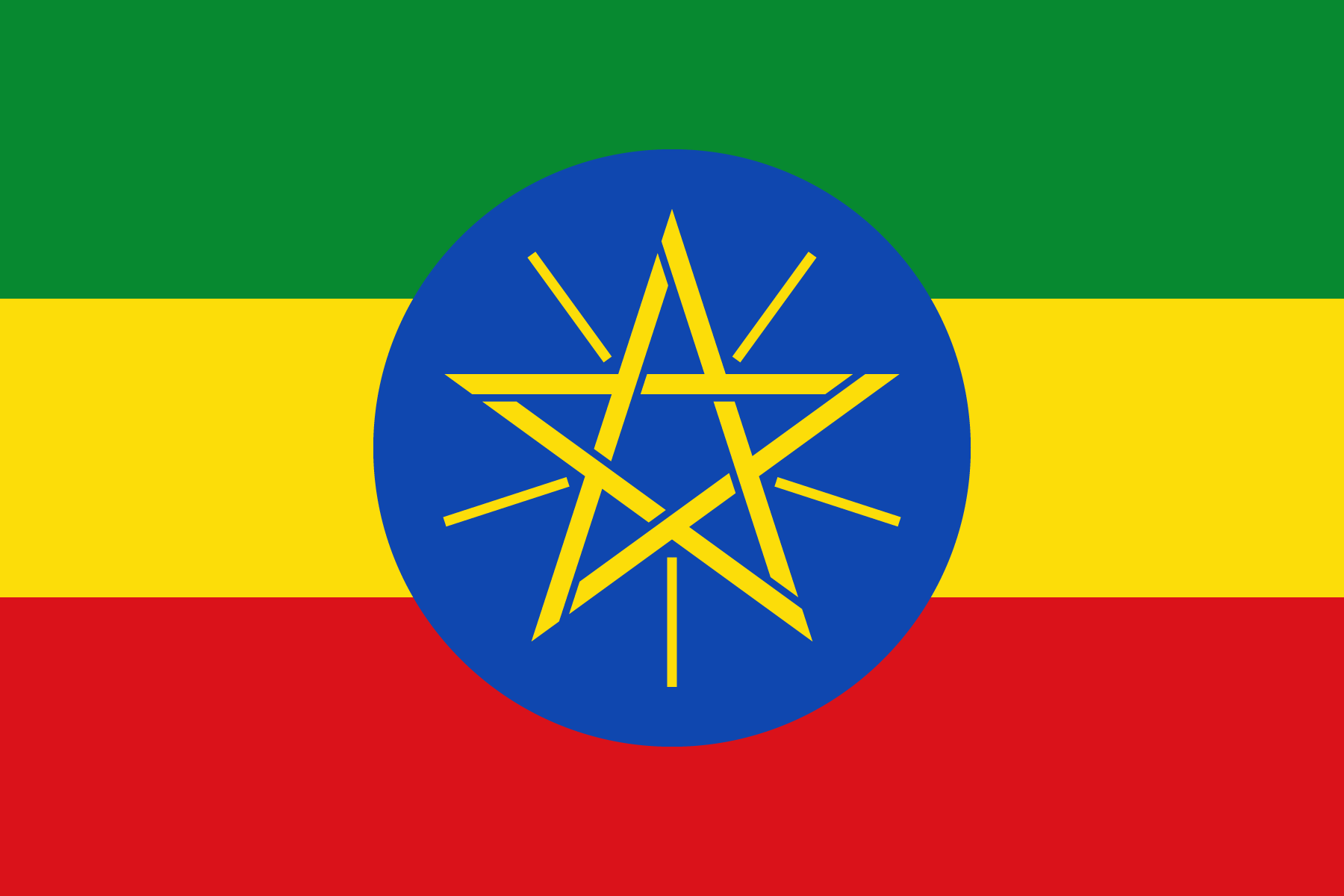The UN Human Rights Council will hold its 35th regular session at Palais des Nations in Geneva from 6 to 23 June 2017.
Stay up-to-date: Follow @ISHRglobal and #HRC35 on Twitter, and look out for our Human Rights Council Monitor.
Don’t miss these side events organised by or involving ISHR:
- Digging deep: defenders reflect on the focus of planned future reports of the SOGI Independent Expert, 7 June, 14:00-15:30, Room VIII
- Civil society organisations and poverty alleviation, 9 June, 13:00-14:30, Room IX
- Civil society space and the private sector, together with CIVICUS, 14 June, 13:30-15:00, Room XXIV
- Bahrain reprisals: Government targeting of civil society for cooperation with the UN (organised by ADHRB), 7 June, 10:30-12:00, Room XXIV
#HRC35 | Thematic areas of interest
Here are some highlights of thesession’s thematic discussions.
Sexual orientation and gender identity
The first annual report of the Independent Expert on protection against violence and discrimination based on sexual orientation and gender identity will be presented between 9:00 and 12:00 on Tuesday 6 June.
The report sets out the work and approach of the mandate holder. ISHR welcomes the Independent Expert’s engagement with civil society and other stakeholders in open and public consultations held in January. The Independent Expert should continue his work with a focus on strengthening the recognition and protection of LGBTI human rights defenders.
ISHR and ILGA will organise an event called ‘Digging Deep: defenders reflect on the focus of planned future reports of the SOGI Independent Expert’, from 14:00 to 15:30 on 7 June in Room VIII. The SOGI core group Argentina, Brazil, Chile, Colombia, Costa Rica, Mexico and Uruguay will organise an event on ‘Advancing human rights protection and ending violence and discrimination based on sexual orientation and gender identity’ on 9 June from 11:30 to 13:00 in Room IX.
Reprisals
During the upcoming Human Rights Council session, the President and Bureau must speak out more clearly about cases of reprisals and follow-up systematically to past cases. ISHR remains deeply concerned over the prevalence and severity of intimidation and reprisals against human rights defenders and other civil society actors engaging with the UN.
In a recent letter to the President of the Human Rights Council, ISHR called for urgent attention to be given to cases of reprisals which have not been followed up by the Human Rights Council. One of the most serious instances of reprisal is against Chinese human rights defender Cao Shunli, who died in detention on 14 March 2014 after being detained for her engagement in UN human rights mechanisms. Despite her case being communicated with the Bureau during the three years following her death, there has been no independent investigation or adequate response.
ISHR looks forward to consolidating the advances made by the recent appointment of Assistant Secretary General Andrew Gilmour to receive, consider and respond to allegations of reprisals. Acts of intimidation and reprisal against human rights defenders seeking to cooperate with the UN constitute violations of international human rights law and undermine the human rights system. The Human Rights Council should respond with appropriate gravity to reprisals and follow up past cases during its 35th session.
Item 5 of the Human Rights Council’s agenda provides a key opportunity for States to raise concern about reprisals, and for those Governments involved in previous cases to provide an update to the Council on any investigations carried out.
Business and human rights
The mandate of the Working Group on human rights and transnational corporations and other business enterprises will be up for renewal during the session. The report of the Working Group will be considered by the Council, in addition to reports of country missions to Mexico and the Republic of Korea.
The Working Group will also present a study on best practices and how to improve the effectiveness of cross-border cooperation between States with respect to law enforcement on the issue of business and human rights, and a report on public procurement (not yet available at time of writing).
Over the past three years, the Working Group has increasingly recognised the role of human rights defenders in ensuring business respect for human rights, and the specific challenges faced by defenders working on business and human rights issues, as exemplified by a dedicated workshop on this topic during its last session in May 2017.
Since the last renewal of the mandate in 2014, the Working Group has also made increasing use of its ability to confront States and companies with allegations of human rights violations. From just 16 such communications in 2014 the Working Group has increased to 21 in 2015 and 42 in 2016.
Both of these trends should be recognised and encouraged by the resolution renewing the mandate of the Working Group.
Women human rights defenders and women’s rights
The annual full day discussion on the human rights of women will take place on Tuesday 13 June from 9:00 to 12:00 and from 15:00 to 18:00. It will focus on engaging men and boys in responding to and preventing violence against women and girls. Engaging with men and boys to combat violence and discrimination against women and girls is essential to efforts to prevent and eliminate all forms of discrimination and violence against them. This should include challenging the harmful gender stereotypes and negative social norms, attitudes and behaviours that underlie and perpetuate such violence.
Equally, it is important that the Council’s discussions and resolutions in this area recognise the critical role of women human rights defenders (WHRDs) and organisations led by women and girls as rights holders and agents of change. They should be involved and consulted in the planning, design, implementation and monitoring of legislation, policies and programmes, including programs aimed at engaging men and boys.
ISHR will support joint advocacy on the resolutions on violence against women and discrimination against women, and on the ‘protection of the family’.
The latter resolution will focus on ‘the rights of older persons in the context of family.’ States must ensure that this resolution upholds universal principles of human rights based on equality and non-discrimination. Many household structures and family forms exist across the world, facing particular situations and challenges that require tailored policy responses.
Policy-making supportive of families should be fact-based, informed by data and analysis of trends, and be responsive to diverse realities and needs to be relevant, effective and inclusive for all. As a guiding principle, legislative and policy development and reforms should ensure the respect and protection of the human rights and well-being of all individuals within families and households, without discrimination regardless of family form, and with particular attention to equal rights within marriage, to gender equality and to protection from violence, including child abuse, gender-based and sexual violence.
Cooperation of States with Special Procedures
There remains a consistent lack of State cooperation with Special Procedures, as demonstrated by the number of communications sent by the experts that have not received a State response, recorded in the Joint Communications Report published at every session of the Human Rights Council.
ISHR welcomes recent developments in making communications more accessible, including the searchable database of communications, but continues to express concern that access to information regarding specific cases and State replies is still hard to find for victims and authors.
#HRC35 | Country-specific developments
China
The Special Rapporteur on extreme poverty and human rights, Pr Philip Alston, will present the report from his country visit to China. Pr Alston was tailed by State security and was prevented from meeting with civil society during his visit. As a result, the country report stresses the necessity of civil society in holding the Chinese Government accountable to human rights standards.
The country visit was further undermined by reprisals. Following a meeting with Pr Alston, disbarred human rights lawyer Jiang Tianyong disappeared. His family was informed of his detention nearly one month later. Despite UN experts calling for an investigation into his disappearance, Jiang remains in ‘residential surveillance in a designated location’.
Pr Alston’s report will be a key opportunity to discuss the ongoing crackdown on human rights defenders and concerns the Office of the High Commissioner for Human Rights for civil society in China.
Burundi
The commission of inquiry on Burundi will present an oral update on 14 and 15 June.
ISHR remains concerned by consistent and deliberate lack of cooperation with human rights mechanisms in Burundi. The country continues to refuse to cooperate with UN Human Rights Council’s Independent Experts and despite the international community’s efforts to mitigate a human rights crisis, the situation continues to deteriorate. ISHR calls on the Burundian authorities to cease attacks against journalists and defenders and to cooperate with the UN commission of inquiry and implement the recommendations from both UN and African Commission reports.
Other country situations
- The interactive dialogue on the Democratic Republic of Congo (DRC) will be from 12:00 to 15:00 on Tuesday 20 June. ISHR is working with the DRC to develop a strong national law on the protection of human rights defenders. While ISHR welcomes the recent adoption of a proposed text for a law that promotes and protects human rights defenders by the DRC Senate, it is important that the Parliament adopts a law that does not limit and restrict the work of defenders. The interactive dialogue will be an opportunity to demand further progress in that regard.
- ISHR welcomes Côte d’Ivoire’s adoption of a decree on the promotion and protection of human rights defenders in Côte d’Ivoire. The Government should now work closely with civil society and the national human rights institution to mandate and adequately resource an effective protection mechanism. With the UN Operation in Côte d’Ivoire ending in June and the mandate of the Independent Expert on Côte d’Ivoire ending at this Council’s session, ISHR is gravely concerned about the military mutinies and the implications this has on freedom of movement and expression of human rights defenders and civil society. The interactive dialogue with the Independent Expert on Côte d’Ivoire will take place from 9:00 to 12:00 on Tuesday 20 June.
- ISHR has joined a coalition of civil society organisations in urging State delegations to the Human Rights Council to express concern about the ongoing human rights crisis in Ethiopia.
#HRC35 | Council programme, appointments and resolutions
Organisational meeting
The programme of work was presented during the organisational meeting for the 35th session. The session includes four round table discussions, 45 reports, and around 30 resolutions.
The President of the Human Rights Council once again urged States to combat reprisals during the session. ‘As part of a constructive working atmosphere, it is in our common interest to have a climate of trust and security, whereby States ensure the appropriate protection against any acts of intimidation or reprisals against individuals and groups that cooperate or have cooperated with the United Nations, their representative and human rights mechanisms,’ he stated.
Appointment of mandate holders
The President of the Human Rights Council has proposed candidates for the following four vacancies of mandate holders to be filled at this session:
- Independent Expert on human rights and international solidarity [HRC resolution 26/6]
- Special Rapporteur on minority issues [HRC resolutions 25/5 and 34/6]
- Special Rapporteur on the human rights of migrants [HRC resolution 26/19]
- Special Rapporteur on the promotion and protection of human rights and fundamental freedoms while countering terrorism [HRC resolution 31/3]
ISHR has called for a transparent and merits based selection of these mandate holders in a recent joint letter to the Consultative Group and for gender diversity of mandate holders to be considered in all appointments.
Panel discussions
During each Council session, panel discussions are held to provide member States and NGOs with opportunities to hear from subject-matter experts and raise questions. Four panel discussions are scheduled for this session:
Resolutions to be presented to the Council’s 35th session
At the organisational meeting on 22 May 2017 the following resolutions were announced (States sponsoring the resolution in brackets):
- Resolution for the extension of the mandate on the Working Group on business and human rights (Norway and core group of Russia, Argentina and Ghana)
- Resolution on accelerating efforts to eliminate all forms of violence against women (Canada)
- Resolution on discrimination against women (Colombia, Mexico)
- Resolution on protection of the family (Egypt, Bangladesh, Belarus, China, Côte d’Ivoire, Mauritania, Morocco, Qatar, Russian Federation, El Salvador, Saudi Arabia, Tunisia, Uganda)
- Resolution on the protection of the human rights of migrants (Mexico)
- Resolution on the protection of human rights and fundamental freedoms while countering terrorism (Mexico)
- Resolution on the contribution of development to the enjoyment of all human rights (China)
- Resolution on human rights in cities and other human settlements (Brazil)
- Resolution on the right to health in the 2030 Agenda for Sustainable Development (Brazil)
- Resolution on the Programme of Activities for the Implementation of the International Decade for People of African Descent (Brazil)
- Resolution on the contribution of parliaments to the work of the Human Rights Council and the Universal Periodic Review (Spain, Ecuador, Philippines, Morocco, Italy, Maldives, Romania)
- Resolution on public policies and the Sustainable Development Goals (Peru, Ecuador, Algeria, Italy, Romania, Italy, Thailand)
- Resolution on the human rights situation in the Syrian Arab Republic (France, Germany, Italy, Jordan, Kuwait, Morocco, Qatar, Saudi Arabia, Turkey, UK and USA )
- Resolution on human rights and climate change (the Philippines, Bangladesh, Vietnam)
- Resolution on child, early and forced marriage (Netherlands, Sierra Leone)
- Resolution on young people and human rights (Côte d’Ivoire, El Salvador, Egypt, France, Philippines, Moldovan Republic, Tunisia)
- Resolution on organising celebrations for anniversary of the Human Rights Council (Russia)
- Resolution on elimination of discrimination of persons affected by leprosy and their family members (Japan)
- Resolution on cooperation with and assistance to Ukraine in the field of human rights (Ukraine)
- Resolution on the independence and impartiality of the judiciary, jurors and assessors, and the independence of lawyers (Australia, Botswana, the Maldives, Mexico, Thailand, Hungary)
- Resolution for renewal of the mandate of the Special Rapporteur on Independence and impartiality of the judiciary, jurors and assessors, and the independence of lawyers (Hungary)
- Resolution for renewal of the Special Rapporteur on the rights of persons with disabilities (Mexico)
- Resolution for the renewal of the mandate of the Special Rapporteur on extrajudicial, summary or arbitrary executions (Sweden)
- Resolution for the renewal of the mandate of the Special Rapporteur on the human rights situation in Belarus (EU)
- Resolution for the renewal of the mandate of the Special Rapporteur on the right to education (Portugal)
- Resolution for the renewal of the mandate of the Special Rapporteur on extreme poverty and human rights (France, Albania, Chile, Morocco, Senegal, Romania, Philippines, Peru)
- Resolution on the enhancement of international cooperation in the field of human rights (Venezuela on behalf of the NAM)
- Resolution for extension of the mandate of the Special Rapporteur on trafficking in persons, especially women and children (Germany and the Philippines)
- Resolution on the human rights of internally displaced persons (Austria)
#HRC35 | Events
ISHR and ILGA will organise an event called ‘Digging Deep: defenders reflect on the focus of planned future reports of the SOGI Independent Expert’, from 14:00 to 15:30 on 7 June in Room VIII. The SOGI core group Argentina, Brazil, Chile, Colombia, Costa Rica, Mexico and Uruguay will organise an event on ‘Advancing human rights protection and ending violence and discrimination based on sexual orientation and gender identity’ on 9 June from 11:30 to 13:00 in Room IX.
ISHR together with other NGOs, will host an event on Civil society organisations and poverty alleviation with Special Rapporteur Professor Philip Alston from 13:00 to14:30 on 9 June 2017 in Room IX.
ISHR together with CIVICUS is organising an event on Civil society space and the private sector fron 13:30 to 15:00 on 14 June in Room XXIV.
Photo: UN Photo /Jean-Marc Ferré




